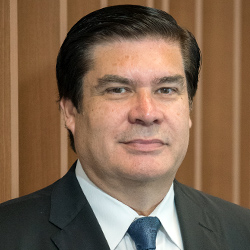Horacio D. Espinosa
Northwestern University
Seminar Information

Metamaterials are synthetic materials engineered to have properties not found in naturally occurring materials. They are being designed for a broad set of applications ranging from light modulation, wearable electronic devices, microrobotics, and energy dissipation and redirection to mention just a few. In this seminar, I will discuss two classes of metamaterials we have investigated, origami and kirigami metamaterials, and 2D metamaterials. Origami and kirigami have their origin in Japanese art, one based on paper folding and the other based on paper cutting. These metamaterials offer a promising approach for the design of deployable structures with property tunability. Together with unusual mechanical properties, the space-filling capabilities of origami and kirigami patterns make them ideal candidates for the design of architected metamaterials with unprecedented functionality. In this presentation, I will discuss results of nanofabrication and in situ scanning electron microscopy mechanical testing of origami and kirigami metamaterials exhibiting several unusual mechanical properties such as anisotropic stiffness, configuration-dependent auxeticity, elastic instabilities and large degree of recovery upon unloading, a unique combination insofar absent from the portfolio of mechanical metamaterials. I will show that machine learning algorithms can be used in the design of these structures, and I will present the impact of the methodology in several potential applications ranging from bioinspired surface texturing to curvature-guided organization for light modulation. I will also present our recent work on in situ TEM fracture testing of 2D metamaterials and atomistic modeling with machine learning parametrized force fields for accurate prediction of chemical bond dissociation leading to fracture.
Horacio D. Espinosa is the James and Nancy Farley Professor of Manufacturing and Entrepreneurship, Professor of Mechanical Engineering, and the Director of the Theoretical and Applied Mechanics Program at the McCormick School of Engineering, Northwestern University. He received his Ph.D. in Solid Mechanics from Brown University in 1992. Espinosa has made contributions in the areas of deformation and failure of materials, design of micro- and nano-systems, in situ microscopy characterization of nanomaterials, and microfluidics for single cell manipulation and analysis. He has published over 300 technical papers in these topics. Espinosa received several awards including the PRAGER Medal from the Society of Engineering Science, the Society for Experimental Mechanics MURRAY and SIA NEMAT NASSER Medals, and the ASME THURSTON award. He is a member of the National Academy of Engineering (NAE), foreign member of Academia Europaea, the Engineering Science in 2012, and is a member of the IUTAM General Assembly.
